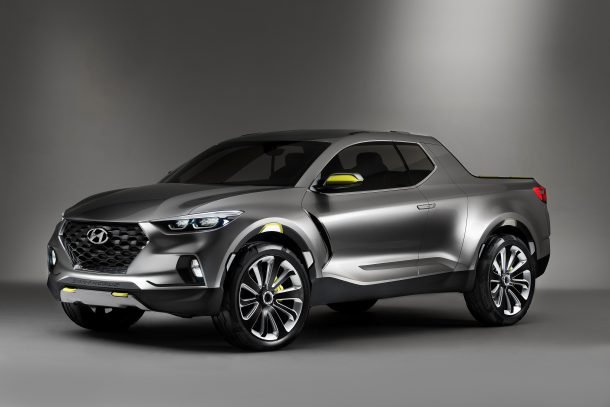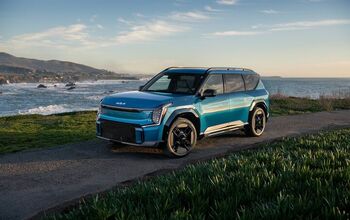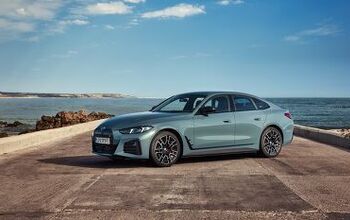U.S., South Korea Reach Trade Deal; No Korean-built Hyundai Pickups in America's Future

The United States and South Korea reached a free trade agreement on Monday that spared the Asian country from punitive steel tariffs, assuming Seoul keeps an eye on just how much steel it sends to American buyers.
A quota on Korean steel exports means the country can only sell 70 percent of its recent average (2015-2017) to the U.S., though it is hardly Korea’s largest export market. The deal, reached “in principle” ahead of both countries’ meetings with North Korean leader Kim Jung UN, will also see South Korea raise the limit for U.S.-made vehicles that needn’t conform to local safety standards from 25,000 to 50,000.
It’s good news for the Trump administration, but not everyone’s thrilled. Hyundai’s union is hopping mad that a steep tariff on Korean-built pickups — which was set to expire in 2021 under the previous agreement — was just renewed for another 20 years.
Calling it “humiliating,” the labor group said it had placed its future hopes on hitting it big in the U.S. pickup market. Now, workers in the country find themselves shut out of what their union calls “the future bread and butter of the South Korean auto industry.” The 25 percent chicken tax on light trucks shipped from Korea will continue until 2041.
“The union has called for domestic production of pickup trucks for the past several years,” the union said in a statement.
Nothing’s stopping Hyundai from building a pickup on U.S. soil, but it won’t help the automaker’s embattled (and quite militant) labor force. Already, falling worldwide sales has both workers and union brass on edge, even as the company hastily adopts a crossover-heavy product strategy. Strikes over wages have become commonplace.
From their vantage point across the Pacific, it wouldn’t be hard to see U.S.-bound pickup trucks as a one-way ticket to wealth and prosperity. Obviously, those Yanks can’t get enough of them. From this side of the ocean, however, we’re wondering when Hyundai will finally show us a product it intends to sell. The unibody Santa Cruz sport truck appeared in Detroit over three years ago, and we’ve since grown tired of Hyundai’s repeated promises that the model will indeed reach production.
Former Hyundai Motor America CEO confirmed the Santa Cruz’s green-lighting in mid-2016, but said the company wasn’t ready to announce it just yet. A year later, Michael J. O’Brien, vice president of corporate and product planning for HMA, again confirmed the model’s future production. As of early 2018, the model remains on Hyundai’s to-do list, but doesn’t carry a firm arrival date. Going on the company’s most recent product plan, the earliest we would see it is in 2020.
Already, the company’s Alabama facilities builds the Sonata, Elantra, and Santa Fe, but word broke late last year that Hyundai is considering Kona, Tucson, and pickup production in the U.S.
As for those Korean workers, they might still get a chance to build a pickup truck for a foreign country — just not the United States. Hyundai Australia is apparently quite interested in a truck, and a brawnier one than the Santa Cruz.

More by Steph Willems
Latest Car Reviews
Read moreLatest Product Reviews
Read moreRecent Comments
- Dale Had one. The only car I ever bought because of a review in a guitar magazine.Sure was roomy inside for such a small car. Super practical. Not much fun to drive even with a manual.Sent it to college with my stepson where it got sideswiped. Later he traded it in on an F-150.
- Bd2 Hyundai's designs are indeed among the most innovative and their battery technologies should allow class leading fuel consumption. Smartstream hybrids are extremely reliable.
- 28-Cars-Later So now H/K motors will last longer in between scheduled replacements. Wow, actual progress.
- AZFelix I have always wondered if the poor ability of Tesla cars in detecting children was due to their using camera only systems. Optical geometry explains that a child half the height of an adult seems to have the same height as that same adult standing twice as far away from the viewer.
- 28-Cars-Later Actually pretty appealing (apparently I'm doing this now). On a similar note, a friend of mine had a difficult situation with a tenant which led to eviction and apparently the tenant has abandoned a 2007 Jag S-Type with unknown miles in the garage so he called me for an opinion. Before checking I said $2-3 max, low and behold I'm just that good with the 3.0L clocking in at $2,3 on average (oddly the 4.2 V8 version only pulls $2,9ish) and S-Types after MY05 are supposedly decent.



































Comments
Join the conversation
The South Korean union is probably the achilles heel for Hyundai. They are keeping Hyundai from being able to move production to where it makes the most business sense, by requiring Hyundai to basically never cut employment without paying heavily for doing so. Yes, Hyundai does have a plant in the US, but what would be better for them is a plant in Mexico. That avoids chicken tax and allows them to produce for global markets (Mexico has free trade with many countries U.S. doesn't, including Brazil where this truck would also sell) at low cost (cheaper labor than China). My guess here is that the S. Korean labor unions won't allow Hyundai to find another "low cost" production base, preferring to export as much as possible from Korea.
Is there any tariff or quota on US cars that DO meet South Korean safety standards? How onerous are those standards? Don't Korean vehicles sold in the US have to meet US standards?